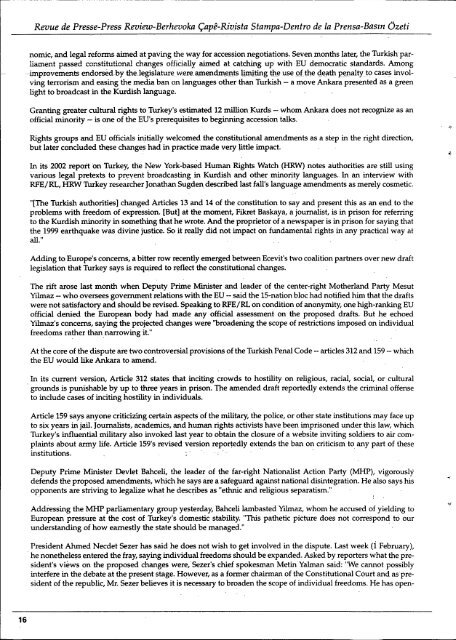Bulletin de liaison etd'information - Institut kurde de Paris
Bulletin de liaison etd'information - Institut kurde de Paris
Bulletin de liaison etd'information - Institut kurde de Paris
You also want an ePaper? Increase the reach of your titles
YUMPU automatically turns print PDFs into web optimized ePapers that Google loves.
Revue <strong>de</strong> Presse-Press Review-Berhevoka Çapê-Riv.ista Stampa-Dentro <strong>de</strong> la Prensa-Basln Özeti<br />
nomic, and legal reforms aimed at paving the way for accession negotiations. Seven months later, the Turkishparliament<br />
passed constitutional c.~a.'1geso££ièially aimed at catching up with. EU <strong>de</strong>mocratic standards. Among<br />
-improvements endorsed-by theJegislature were_~endments limiting th~use Q{the <strong>de</strong>ath RenaltyJo case~ involving<br />
terrorism and easing the media ban on languages other than Turkish - a move Ankara presented as a green<br />
light to broadcast in the Kurdish language.<br />
Granting greater cultural rights to Turkey's estimated 12 million Kurds - whom Ankara does not recognize as an<br />
official minority - is one of the EU's prerequisites to beginning accession talks.<br />
Rights groups and EU officials initially welcomed the constiq,Itional amendments as a step in the right direction,<br />
but later conclu<strong>de</strong>d these changes had in practice ma<strong>de</strong> very little impact.<br />
.,<br />
In its 2002 reporlon Turkey, the New York~based Human Rights Watch (HRW) notes authorities are still using<br />
various legal pretexts to prevent broadcasting in Kurdish and other minority languages. In an interview with<br />
RFE/RL, HRW Turkey researcher Jonathan Sug<strong>de</strong>n <strong>de</strong>scribed last fall's language amendments as merely cosmetic.<br />
"[The Turkish authorities] changed Articles 13 and 14 of the constitution to say and present this as an end to the<br />
problems with freedom of expression. [But] at the moment, Fikret Baskaya, a journalist, is in prison for referring<br />
to the Kurdish minority in something that he wrote. And the proprietor of a newspaper is in prison for saying that<br />
the 1999 earthquake was divine justice. So it really did not impact on fundamental rights in any practical way at<br />
all." .<br />
Adding to Europe's concerns, a bitter row recently emerged between Ecevit's two coalition partners over new draft<br />
legislation tha:t Turkey says is required to reflect the constitutional changes.<br />
The rift arose last month when Deputy Prime Minister and lea<strong>de</strong>r of the center-right Motherland Party Mesut<br />
Yilmaz - who oversees government relations with the EU - said the IS-nation bloc had notified him that the drafts<br />
were not satisfactory and should be revised. Speaking to RFE/RL on condition of anonymity, one high-ranking EU<br />
official <strong>de</strong>nied the European body had ma<strong>de</strong> any official assessment on the proposed drafts. But he echoed<br />
Yilmaz's concerns, saying the projected changes were "broa<strong>de</strong>ning the scope of restrictions imposed on individual<br />
freedoms rather thannarrowing it."<br />
At the core of the dispute are two controversial<br />
the EU would like Ankara to amend.<br />
provisions of the Turkish Penal Co<strong>de</strong> -- articles 312 and 159 -- which<br />
In its current version, Article 312 states that inciting crowds to hostility on religious, racial, social, or cultural<br />
. grounds is punishable by up to three years in prison. The amen<strong>de</strong>d draft reportedly extends the criminal offense<br />
to inclu<strong>de</strong> cases of inciting hostility in individuals.<br />
Article 159 says anyone criticizing certain aspects of the military, the police, or other state institutions may face up<br />
to six years in jail. Journalists, aca<strong>de</strong>mics, and human rights activists have been imprisoned un<strong>de</strong>r this law, which<br />
Turkey's influential military also invoked last year to obtain the closure of a website inviting soldiers to air complaints<br />
about army life. Article 159's revised version reportedly extli!nds the ban o~ criticism to any part of these<br />
institutions. . .<br />
Deputy Prime Minister Devlet Bahceli, the lea<strong>de</strong>r of the far-right Nationalist Action Party (MHP), vigorously<br />
<strong>de</strong>fends the proposed amendments, which he says are a safeguard against national disintegration. He also says his<br />
opponents are striving to legalize what he <strong>de</strong>scribes as "ethnic and religious separatism."<br />
Addressing the MHP parliamentary group yesterday, Bahceli lambasted Yilmaz, whom he accused of yielding to<br />
European pressure at the cost of Turkey's domestic stability. "This pathetic picture does not correspond to our<br />
un<strong>de</strong>rstanding of how earnestly the state should be managed." ..<br />
~j<br />
Presi<strong>de</strong>nt Ahmed Nec<strong>de</strong>t Sezer has said he does not wish to get involved in the dispute. Last week (i February),<br />
.he nonetheless entered the fray, saying individual freedoms should be expan<strong>de</strong>d. Asked by reporters what the presi<strong>de</strong>nt's<br />
vÏl~ws on the proposed changes were,Sezer's chief spokesman MetinYa1man said: "We cannot possibly<br />
inte<strong>de</strong>re in the <strong>de</strong>bate at the present stage. However, as a former chairman of the Constitutional Court and as presi<strong>de</strong>nt<br />
of the republic, Mr. Sezer believes it is necessary to broa<strong>de</strong>n the scope of individual freedoms. He has open-<br />
16
















